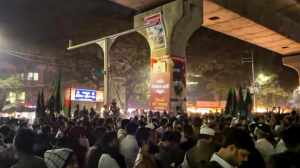Robin Hood in reverse
Does the administration of internal security make class distinctions?

Does the administration of internal security make class distinctions? A close examination of the UPA government8217;s record suggests so, which ironic considering that the alliance came to power harping on how its heart lies with the aam aadmi. Nearly 600 people have been killed in major terror attacks, mostly bomb blasts, from Delhi to Mumbai to Jaipur to Hyderabad and Ahmedabad since 2004. Cities thought to be distant from the mind of hate-mongers believed to be operating from across the borders, like Varanasi, Lucknow, Ajmer, Bangalore and Malegaon, have also not been spared from the shadow of suspected Islamist terror. Which is why when Prime Minister Manmohan Singh and others in the Congress start talking about the need for tougher laws to deal with terror, it should be seen as a bit of an admission of defeat considering one of the first major policy moves of this government was to do away with POTA in an attempt to proclaim its secular credentials.
A vast majority of the nearly 600 people killed in the country in the terror attacks could easily be described as the aam aadmi. The first major terror attack under UPA rule were the three blasts that hit Delhi on Diwali eve and killed 66 people in places like Paharganj and Sarojini Market. The pattern or target selection has been the same since: the Sankatmochan temple in Varanasi, the local trains of Mumbai, the prayer grounds near a mosque in Malegaon, the second-class coaches of Samjhauta Express, the crowded roadside eatery, the mosque and the amusement park in Hyderabad, local courts in Lucknow, Faizabad and Varanasi, and markets, temples and hospitals in Jaipur, Ahmedabad and again Delhi now. Police, security analysts and even politicians try to explain this away by pointing out that the sheer size and congested nature of many of them in a country of 1.1 billion people makes them next to impossible to secure. Platitudes have been offered every time, by the PM, the much-maligned Home Minister and the Congress party president. But that hasn8217;t changed anything.
On the other hand, consider how the Indian state responded during two of the most high-profile acts of terrorism before this series of attacks. After being disgraced by the hijack of IC-814 to Kandahar and the release of terrorists, New Delhi cut off air links with Kathmandu and virtually brought Nepal8217;s tourism industry to its knees. Flights were restored only after Nepal got its act together and made Tribhuvan International Airport watertight, going even as far as allowing the stationing of an Indian security team to screen passengers. Airport security around the country was further tightened after 9/11 and the proof of its success lies in the fact that there has not been a single security incident worth the mention since.
Again, after the attack on Parliament, India nearly went to war with Pakistan, sparking panic around the world about the possibility of a nuclear conflict. Meanwhile, those who have been to the Parliament complex after new security measures were put in place will testify how impregnable a fort it has now become. That all this happened under another political dispensation might be minor consolation. But what does this say about how the Indian system responds to security threats and terrorist attacks on well-heeled people who can afford to fly or the politicians who can afford to get elected and those who have to sweat it out in the local trains of Mumbai or shop in the grubby lanes of Karol Bagh?
At a larger level, why have the Centre and the states made such slow progress on increasing the ratio of the number of policemen to the population? On recruiting more Muslims in the police and intelligence agencies? On adapting to technology faster and cutting red-tape in inter-state co-ordination? And on speedier implementation of the recommendations of the Justice Rajinder Sachar Committee to raise the socio-economic status of Muslims? Why, for instance, does the PM hold forth more on Naxal violence in his speech at the Chief Minister8217;s Conference on Internal Security and make only a passing reference to suspected Islamist terror less than a month after Lucknow, Varanasi and Faizabad were hit by bombs? Is it because urban centres hit by terrorism do not constitute vote-banks and it is blasphemy for this UPA government to even call a shovel a spade? The Manmohan Singh PMO frittered away a golden chance to make peace with Pakistan while Musharraf was around 8212; which would have also addressed the terrorism within to an extent 8212; and is now seeking to hang its internal security failures on the Shivraj Patil. If Singh could directly handle diplomacy with the Americans and ensure that the nuclear deal was pulled off, he and his office could very well have carried the burden of trying to secure the country. The PMO, which includes an intelligence stalwart like M K Narayanan, has much to answer and events over the last few days indicate that it might have just woken up to this truth. Unfortunately for the country, it may have come a tad late in the term of this government and it will now become the legacy for its successor.
yprajeshexpressindia.com
- 01
- 02
- 03
- 04
- 05































